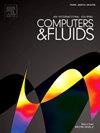弱可压缩流的通用混合方法
IF 3
3区 工程技术
Q3 COMPUTER SCIENCE, INTERDISCIPLINARY APPLICATIONS
引用次数: 0
摘要
通用混合有限元方法最初是由Chen和Williams在“不可压缩Navier-Stokes方程的通用混合方法”中为等温不可压缩流动开发的,“计算机与应用数学”,第80卷,2020年。此后,这些方法由Miller, Chen和Williams在“非等温不可压缩流的通用混合方法”中推广到非等温不可压缩流,“计算机与应用数学,第125卷,2022年。这些方法的主要优点在于它们的灵活性。与传统的混合方法不同,它们保留了动量和温度方程中的散度项。因此,即使在存在非零散度的情况下,也保持了该格式的有利性质。这使它们成为扩展到可压缩流的理想候选者,其中散度通常不会消失。在本文中,我们最后构造了这些方法的可压缩扩展。此外,我们还证明了所得到的方法在不可压缩极限附近出现的弱可压缩流动以及在接近0.5马赫时出现的中等可压缩流动方面的优异性能。本文章由计算机程序翻译,如有差异,请以英文原文为准。
Versatile mixed methods for weakly-compressible flows
Versatile mixed finite element methods were originally developed by Chen and Williams for isothermal incompressible flows in “Versatile mixed methods for the incompressible Navier–Stokes equations,” Computers & Mathematics with Applications, Volume 80, 2020. Thereafter, these methods were extended by Miller, Chen, and Williams to non-isothermal incompressible flows in “Versatile mixed methods for non-isothermal incompressible flows,” Computers & Mathematics with Applications, Volume 125, 2022. The main advantage of these methods lies in their flexibility. Unlike traditional mixed methods, they retain the divergence terms in the momentum and temperature equations. As a result, the favorable properties of the schemes are maintained even in the presence of non-zero divergence. This makes them an ideal candidate for an extension to compressible flows, in which the divergence does not generally vanish. In the present article, we finally construct the compressible extension of the methods. In addition, we demonstrate the excellent performance of the resulting methods for weakly-compressible flows that arise near the incompressible limit, as well as moderately-compressible flows that arise near Mach 0.5.
求助全文
通过发布文献求助,成功后即可免费获取论文全文。
去求助
来源期刊

Computers & Fluids
物理-计算机:跨学科应用
CiteScore
5.30
自引率
7.10%
发文量
242
审稿时长
10.8 months
期刊介绍:
Computers & Fluids is multidisciplinary. The term ''fluid'' is interpreted in the broadest sense. Hydro- and aerodynamics, high-speed and physical gas dynamics, turbulence and flow stability, multiphase flow, rheology, tribology and fluid-structure interaction are all of interest, provided that computer technique plays a significant role in the associated studies or design methodology.
 求助内容:
求助内容: 应助结果提醒方式:
应助结果提醒方式:


